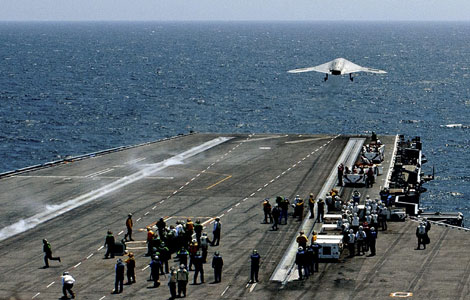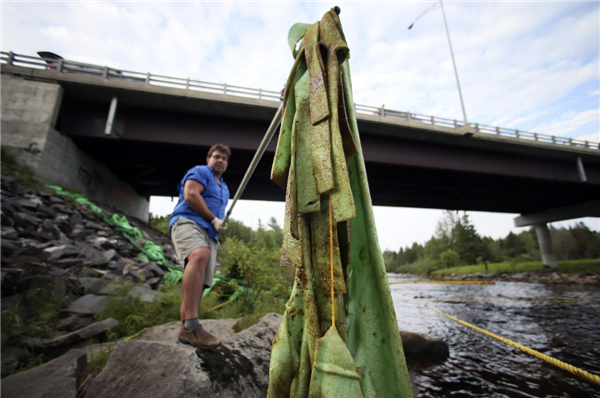Quebec town grapples with loss after train wreck
Updated: 2013-07-11 17:00
(Agencies)
|
||||||||
LAC-MEGANTIC, Quebec - Residents of the town of Lac-Megantic in Quebec were coming to grips on Thursday with the reality that 50 of their own were most likely dead in the aftermath of the worst railway disaster in North American in more than two decades.
Five days after a train hauling 72 cylinders of crude oil jumped the track and exploded into a wall of fire, provincial police said they had recovered 20 bodies, with another 30 people still missing and presumed dead, confirming the worst fears of a community that had all but given up hope.
"She's dead," said Jean-Guy Lapierre of his niece, holding a copy of a Quebec tabloid that had printed pictures of some of the town's missing young people on its front page. "She was just 28."
The crash and subsequent explosions rocked the eastern Canadian town of Lac-Megantic shortly after 1 am (0500 GMT) on Saturday, leveling its historic downtown strip.
Numerous houses and businesses were burned to the ground, including the Musi-Cafe, a popular bar that was packed with people, eyewitnesses told Reuters.
On Wednesday, the head of the railway company said the engineer probably did not set enough handbrakes when he parked his train some eight miles (13 km) west of town late on Friday, leading to the deadly accident. The official apologized to residents of the town of about 6,000.
The words of remorse came too late for many locals who remain angry at the company - Montreal Maine and Atlantic - and accuse chairman Ed Burkhardt of shirking responsibility for the accident.
"They still aren't taking the blame," said Christiane, a woman who lived near the blast site and declined to give her last name. "First it's the firemen, now the engineer, who will they blame tomorrow?"
Burkhardt had previously said that the air brakes that would have prevented the disaster failed because they were powered by an engine that was shut down by firefighters as they dealt with a fire shortly before the catastrophe occurred.
On Wednesday, his focus was squarely on the engineer.
"It's very questionable whether the hand brakes were properly applied on this train," he told a crush of reporters. "As a matter of fact, I'll say they weren't, or we wouldn't have had this incident."
More than 200 investigators are working day and night to sift through the charred wreckage in the center of town in what authorities say is a crime scene. They have made no arrests.
A death toll of 50 would make the accident Canada's deadliest since in 1998, when a Swissair jet crashed into the Atlantic off the coast of Nova Scotia, killing 229 people.
It would also be North America's worst rail crash since 1989, when 112 people died when an 11-car passenger train plunged off a bridge in Mexico.

 Surviving students hosted by consulate
Surviving students hosted by consulate
 China investigates GSK executives for bribery
China investigates GSK executives for bribery
 China, Russia complete 3-day joint naval drill
China, Russia complete 3-day joint naval drill
 US drone completes 1st carrier landing
US drone completes 1st carrier landing
 Sino-US talks 'help build trust'
Sino-US talks 'help build trust'
 Boston Marathon bombing suspect pleads not guilty
Boston Marathon bombing suspect pleads not guilty
 Caution urged in seeking experts from abroad
Caution urged in seeking experts from abroad
 Shanghai struggles with growth
Shanghai struggles with growth
Most Viewed
Editor's Picks

|

|

|

|

|

|
Today's Top News
George W.Bush pushes for immigration reform
S&ED talks hit harmonious note
Surviving students hosted by consulate
Senators skeptical about Smithfield deal
Beijing has world's most delayed airport
Caution urged in seeking experts from abroad
Snowden is likely Venezuela bound
Obama pushes House Republicans on immigration
US Weekly

|

|







